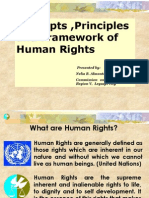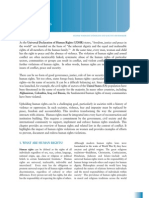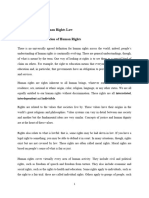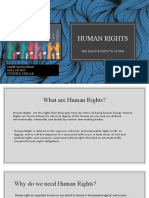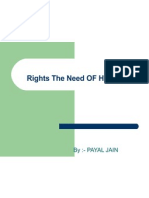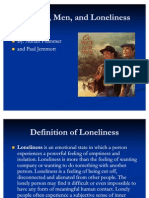Human Rights
Human Rights
Uploaded by
Pallavit AggarwalCopyright:
Available Formats
Human Rights
Human Rights
Uploaded by
Pallavit AggarwalCopyright
Available Formats
Share this document
Did you find this document useful?
Is this content inappropriate?
Copyright:
Available Formats
Human Rights
Human Rights
Uploaded by
Pallavit AggarwalCopyright:
Available Formats
Imagine a life without any freedom or even without any respect in society... sounds tough, right?
Often at times, we come across this term 'human rights' and overlook it thinking we've heard it all. We do not realize the importance of human rights until we imagine the plight of people who are deprived of these fundamental rights. Human rights refer to the "basic rights and freedoms to which all humans are entitled." Examples of rights and freedoms, which are included as civil and political rights under human rights, are the right to life and liberty, freedom of expression, and equality before the law; and social, cultural and economic rights, including the right to participate in culture, the right to food, the right to work, and the right to education. Well, here is some information about the human rights issues that everyone should be aware of. The Universal Declaration of Human Rights, which was adopted by the UN General Assembly on 10 December 1948, was the result of the experience of the Second World War. With the end of that war, and the creation of the United Nations, the international community vowed never again to allow atrocities like those of that conflict happen again. World leaders decided to complement the UN Charter with a road map to guarantee the rights of every individual everywhere. The document they considered, and which would later become the Universal Declaration of Human Rights, was taken up at the first session of the General Assembly in 1946. The Assembly reviewed this draft Declaration on Fundamental Human Rights and Freedoms and transmitted it to the Economic and Social Council "for reference to the Commission on Human Rights for consideration . . . in its preparation of an international bill of rights." The Commission, at its first session early in 1947, authorized its members to formulate what it termed "a preliminary draft International Bill of Human Rights". Later the work was taken over by a formal drafting committee, consisting of members of the Commission from eight States, selected with due regard for geographical distribution. The Commission on Human Rights was made up of 18 members from various political, cultural and religious backgrounds. The UDHR is generally agreed to be the foundation of international human rights law. Adopted almost 60 years ago, the Universal Declaration of Human Rights (UDHR) has inspired a rich body of legally binding international human rights treaties and human rights development worldwide. It continues to be an inspiration to us all whether in addressing injustices, in times of conflicts, in societies suffering repression, and in our efforts towards achieving universal enjoyment of human rights. It represents the universal recognition that basic rights and fundamental freedoms are inherent to all human beings, inalienable and equally applicable to everyone, and that every one of us is born free and equal in dignity and rights. Whatever our nationality, place of residence, gender, national or ethnic origin, colour, religion, language, or any other status, the international community on December 10 1948 made a commitment to upholding dignity and justice for all of us. The core principles of human rights first set out in the UDHR, such as universality, interdependence and indivisibility, equality and non-discrimination, and that human rights simultaneously entail both rights and obligations from duty bearers and rights owners, have been reiterated in numerous international human rights
conventions, declarations, and resolutions. Today, all United Nations member States have ratified at least one of the nine core international human rights treaties, and 80 percent have ratified four or more, giving concrete expression to the universality of the UDHR and international human rights. Not every question of social justice or wise governance is a human rights issue. For example, a country could have too much income inequality, inadequate provision for higher education, or no national parks without violating any human rights. Deciding which norms should be counted as human rights is a matter of some difficulty. And there is continuing pressure to expand lists of human rights to include new areas. Many political movements would like to see their main concerns categorized as matters of human rights, since this would publicize, promote, and legitimize their concerns at the international level. A possible result of this is human rights inflation, the devaluation of human rights caused by producing too much bad human rights currency. It is a grave oversimplification to suggest that there is a neat line defined by human rights where national sovereignty ends and tolerance stops. There is no need to deny that human rights are helpful in identifying the limits of justifiable toleration, but there are several reasons to doubt that they simply define that boundary. First, the fulfilment of human rights is a very vague idea. No country fully satisfies human rights; all countries have significant human rights problems. Some countries have large human rights problems, and many have massive problems (gross violations of human rights). Beyond this, the responsibility of the current government of a country for these problems also varies. The main responsibility may belong to the previous government and the current government may be taking reasonable steps to move towards greater compliance. List of Human Rights Issues The human rights situation in India is indeed dismal. The most basic of human rights, right to life, itself is not guaranteed to nearly, 56000 citizens annually the number of people who die on the roads every year. There are still pockets in India where untouchability is practiced and human beings are discriminated against on account of their birth. Child labour is widely prevalent and young children lead a life quite close to slavery. There are frequent caste wars or group war on the basis of either language or religion. In India, the poor break the law to survive, the rich to feet richer and the vast majority out of sheer habit. Absence of rule of law has become the single biggest cause of all kinds of violence, including repression by State agencies. Human rights abuses are instances of individual aberration and not institutional. Unlike in communist countries or some theocracies, oppression of groups or political opponents is not a state policy, let alone principle of the State. Though the rules are not followed and implemented in India with intensity as in other nations but still some of them are mentioned below and are regarded as fundamental human rights. Adequate Housing: While you sit in your cozy home and curl up in your comfy bed, think about the millions of people around the globe, who are homeless under the skies. Adequate housing is one of the basic human needs and according to the United Nations Centre for Human Settlements, there are more than one billion homeless people across the world. As rightly defined by the first special rapporteur in the adequate housing section, "The human right to adequate housing is the right of every woman, man, youth and child to gain and sustain a safe and
secure home and community in which to live in peace and dignity." The UN also has a set of legal obligations for governments of all nations, which ensures that proper steps are being taken in order to tackle the issues of adequate housing in all the countries. In addition to adequate housing, access to drinking water and adequate sanitation facilities are also considered vital. The Universal Declaration of Human Rights proclaims that, "Everyone has the right to a standard of living adequate for the health and well-being of himself and of his family, including food, clothing, housing and medical care and necessary social services, and the right to security in the event of unemployment, sickness, disability, widowhood, old age or other lack of livelihood in circumstances beyond his control." Business and Human Rights: Industrialization does not imply disregard for human rights and degradation of environmental safety. How many times have you come across issues like trees being cut down to set up large manufacturing plants or untreated polluted chemicals being drained into natural water bodies? It is time that we realize that no business or no monetary transaction in this world is greater than human life or environmental health. One of the effects of globalization is the escalating trans-national trade or business transactions. Business transactions can involve issues like acquiring land, formulating ethical policies for employees and workers and many other issues which need to fit into an internationally recognized legal and moral structure. Some of the key factors that need to be tackled in business and human rights are abolition of forced labor, child labor and employee discrimination. The Human Rights Council also believes that the businesses should uphold the freedom of association and effective recognition of the right to collective bargaining. In addition, the businesses should also be ready to support environmental challenges by promoting environmental responsibility and adopting environment friendly technologies. The Office of the United Nations High Commissioner for Human Rights also provides assistance to develop norms on the responsibilities of transnational corporations and other business enterprises with regard to human rights. Today, a large number of corporate organizations are focused on the impact they have on individuals, communities and the environment. Respect to human rights is one of the indispensable parts of corporate social responsibility. In addition to this, a large number of corporate organizations are also realizing that, abiding by the human rights policies, also leads to an overall improved business performance. Human Rights for Children: There is no trust more sacred than the one the world holds with children. There is no duty more important than ensuring that their rights are respected, that their welfare is protected, that their lives are free from fear and want and that they can grow up in peace. ~ Kofi Annan Improvement of overall conditions of unprivileged children across the world remains to be one of the major human rights issues. Undoubtedly, children are a very important demographic of the world population and hence, their problems and needs should be taken care of. If we hope for a better world in the future, we need to focus on the development and progress of children and need to acknowledge their needs. Many children across the world are facing ghastly tribulations, some of which are too much to handle even for adult human beings. There are approximately 300,000 children from several countries, who are under the age of eighteen, and are participating in armed conflicts and wars. Despite several laws being enforced, child labor is still rampant in many countries. There is a lot of work to be done to check the police violence against children, or the abolition of death penalty for
minors. Work also needs to be done to improve the plight of children in orphanages or correctional institutions. Discrimination in education based on race, gender or even medical conditions. There are also issues of child abuse, prostitution, trafficking for child labor and mistreatment of refugee or migrant children. Also, female infanticide is still rampant in some Asian countries. Civil and Political Rights : Freedom to enjoy basic civil and political rights is also a part of human rights issues. Human rights include civil and political rights like the right to life and liberty, freedom of expression, and equality before the law; and other social, cultural and economic rights which include the right to participate in culture, the right to food, right to work, and the right to education as well. The Universal Declaration of Human Rights lists certain civil and political rights in its covenant. The nations are conferred the rights to self-determination and the right to own, trade and dispose of their property freely and not be deprived of their means of subsistence. The individual rights include, the right to life, the right to liberty and freedom of movement, the right to equality before the law, the right to presumption of innocence until proven guilty, the right to appeal a conviction, the right to be recognized as a person before law, the right to privacy and protection of privacy by law, the freedom of thought, conscience, religion, opinion, expression, the freedom of assembly and association and of course, the right to legal recourse when their rights have been violated. Climate Change: The tragic incidents of hurricanes, tsunami, earthquakes and many other natural disasters have seen victims succumb to death, many left homeless, some robbed of their livelihood and millions bereaved. The impact of such extreme climatic changes on human life is, thus one of the important human rights issues. Climate change is a serious environmental issue, but in addition to that, the effects of climate change on basic human rights is also an equally important issue. The Office of the High Commissioner for Human Rights has cited the safety of marginalized groups from climate changes as one of the human rights issues. The extreme climatic changes could result in a large number of people suffering from problems like malnutrition, water shortage, drought, floods, heat stress, epidemics, loss of livelihood and permanent displacement. Environment: Increasing industrialization has led to several manufacturing processes and waste management practices that have hazardous effects on human life. The importance of ecological issues and their impact on the normal human life remain to be an area that needs attention as well. The impact of the illicit movement and dumping of toxic and dangerous products and wastes on human life throughout the world, is also an important human rights issue. Food: While some countries are busy pointing fingers at others for excessive consumption of food, it is a fact that there are sections of the world, which are faced with extreme cases of starvation and malnutrition. Adequate food to meet the nutritional requirements of the body is one of the basic human rights. Genocide: Human life is valuable and destruction of human life is perhaps the greatest violation of human rights. Genocide which means deliberate destruction, in whole or in part, of an ethnic, racial, religious or national group, is a major human rights issue.
Globalization: The negative effects of globalization as regards to the environmental issues and other social issues are one of the major concerns. Tackling the negative effects of globalization and limiting its impact on human rights is also one of the major human rights issues. Health: He who has health has hope; and he who has hope has everything. Health is perhaps one of the most basic human rights. The right to health is an all-encompassing right, which not only includes timely and appropriate health care, but also fundamental elements of health like adequate sanitations, access to safe and potable water, healthy occupational and environmental conditions and access to health-related education and information. Every human being has the right to control his/her health, including the right to be free from non-consensual medical treatment. Human Trafficking: Human trafficking is nothing, but the illegal recruitment, transport or sale of human beings into forced labor and servitude and is one of the most tragic violations of human rights. Especially, trafficking of women and children for prostitution or labor is more rampant and needs appropriate measures for abolition of such practices. Poverty: Wherever we lift one soul from a life of poverty, we are defending human rights and whenever we fail in this mission, we are failing human rights.~ Kofi Annan. The dearth of income or economic deprivation is considered as a violation of human rights since economic deprivation has its own social, political and cultural implications, which affect a human being's psychological and physical health. Since poverty renders most of the essential human rights nullified, it is perhaps one of the most complex human rights issues. Right to health, housing, food and safe water, and the right to education or the civil and political rights stand nullified, once poverty comes into picture. While tackling the issue of eradication of poverty, the Human Rights Council aims at providing an adequate standard of living and other fundamental economic, social, cultural, civil and political rights. Racism: Racism is man's gravest threat to man - the maximum of hatred for a minimum of reason.~ Abraham J. Heschel. In an age, where we are talking about being global citizens of one world and tackling the universal threats, it is most shameful for people to create rifts within themselves and divide the society under the name of race. Discrimination owing to racism or religion for that matter is violation of human rights. Racism is one vital human rights issue, which is addressed by the Human Rights Council by passing stringent laws against racism and supervising the successful implementation of the same. The Durban Declaration and Programme of Action under the Office of the United Nations High Commissioner for Human Rights recommends that, "The Commission on Human Rights prepare complementary international standards to strengthen and update international instruments against racism, racial discrimination, xenophobia and related intolerance in all their aspects. Women: Women constitute an important demographic of the world population and although equality of men and women being increasingly accepted in several societies, there exists several places in the world where the women are still being treated without respect. The plight of women across the world is one of the major human rights issues, which needs to be propagated so that women across the world can enjoy their freedom and liberty, which
every human being is entitled to. Despite of all the social, economical and political evils, the population of the world is striving for a better future. We need to be united in our efforts to safeguard the human rights. Human rights are not just for the international organizations to propagate and for us to read in the newspapers. Be an active part of the global community that you live in and do your bit towards the society. PALLAVIT AGGARWAL. XI-A.
You might also like
- Narrative Child Protection InsetDocument1 pageNarrative Child Protection Insetmichelle c lacad81% (16)
- Badminton Umpire Training ManualDocument122 pagesBadminton Umpire Training Manualsweetfever75% (4)
- Human Rights Concepts, Principles & FrameworkDocument55 pagesHuman Rights Concepts, Principles & FrameworkMichelle Quiquino Foliente100% (4)
- Divorce Concept PaperDocument14 pagesDivorce Concept PaperClaire Greenlee100% (1)
- Ds-260 For ClientsDocument16 pagesDs-260 For ClientsPremium77036No ratings yet
- Wounded Knee PowerpointDocument11 pagesWounded Knee Powerpointapi-287412792100% (1)
- Introduction To Universal Declaration of Human RightsDocument6 pagesIntroduction To Universal Declaration of Human RightsDhriti Sharma100% (1)
- Human RightsDocument9 pagesHuman RightsMahi YadavNo ratings yet
- PWSUNP160820211025094814900HUMAN RIGHTS-MAGNA CARTAdocxDocument8 pagesPWSUNP160820211025094814900HUMAN RIGHTS-MAGNA CARTAdocxBhavya JainNo ratings yet
- What Are Human Rights?Document3 pagesWhat Are Human Rights?jevaniapalitNo ratings yet
- Are Human Rights Eligible To Be Regarded As Basic Rights or Natural RightsDocument6 pagesAre Human Rights Eligible To Be Regarded As Basic Rights or Natural RightsAditya PandeyNo ratings yet
- Excerpts HR Makes Man Human JWDDocument5 pagesExcerpts HR Makes Man Human JWDCrystal AubadeNo ratings yet
- Human RightsDocument8 pagesHuman RightsAjiteshNo ratings yet
- JOLYNN Human RihtDocument17 pagesJOLYNN Human RihtAline MarquesNo ratings yet
- LLB, HR 1Document163 pagesLLB, HR 1Salman QadeerNo ratings yet
- MYP5 I - S U2 Notes Human - RightsDocument4 pagesMYP5 I - S U2 Notes Human - RightsVirenNo ratings yet
- UNICEF-Human RightsDocument11 pagesUNICEF-Human RightskhimpotchingNo ratings yet
- 4 Lectures On Human RightsDocument67 pages4 Lectures On Human RightsMarc Gar-ciaNo ratings yet
- CCCCCCCCCCCCCCCCCCCCCCCCCCCCC CCCCCCCCCCCC: CCCCCCCCCCCCCCCCCCCCCCCCCCCCCDocument8 pagesCCCCCCCCCCCCCCCCCCCCCCCCCCCCC CCCCCCCCCCCC: CCCCCCCCCCCCCCCCCCCCCCCCCCCCCSundeep KashyapNo ratings yet
- Human Rights Semester Suggestion IIDocument22 pagesHuman Rights Semester Suggestion IIrevodan666No ratings yet
- Human Rights ViolationsDocument4 pagesHuman Rights ViolationsBeepoy BrionesNo ratings yet
- KK HUMAN RIGHTS Research PaperDocument6 pagesKK HUMAN RIGHTS Research Paperkiran kombeNo ratings yet
- The Importance of Human Right in Your LifeDocument15 pagesThe Importance of Human Right in Your LifeimenhassineammarNo ratings yet
- 14 - Suggestions and ConclusionDocument19 pages14 - Suggestions and ConclusionAlok NayakNo ratings yet
- Human rights (3)Document10 pagesHuman rights (3)Malaika AshrafNo ratings yet
- Human Rights ProjectDocument3 pagesHuman Rights Projectashu326290No ratings yet
- Gender and Human Right HandoutDocument39 pagesGender and Human Right HandoutTaju MohammedNo ratings yet
- AutomotiveDocument8 pagesAutomotivemoatef710No ratings yet
- Public International Law and Human RightsDocument15 pagesPublic International Law and Human RightsKarishmaNo ratings yet
- Bhum Dossier 2016Document53 pagesBhum Dossier 2016Ronny Mena SotoNo ratings yet
- Human Rights - Role of NgosDocument9 pagesHuman Rights - Role of NgosRahul SinghNo ratings yet
- GST Project by Auishi Class 12 e 1Document19 pagesGST Project by Auishi Class 12 e 1chhavi nagarwalNo ratings yet
- Seminar On Importance of Human RightsDocument7 pagesSeminar On Importance of Human RightsAbdela Aman MtechNo ratings yet
- What Are Human Rights?Document4 pagesWhat Are Human Rights?Academic BunnyNo ratings yet
- Derechos UniversalesDocument2 pagesDerechos UniversalesTaty CNo ratings yet
- UDHR Core ConceptsDocument3 pagesUDHR Core ConceptsEman KhurramNo ratings yet
- Human_Rights_RegimeDocument13 pagesHuman_Rights_RegimeJulia bomfimNo ratings yet
- Universal Declaration of Human RightsDocument6 pagesUniversal Declaration of Human RightsDianne YcoNo ratings yet
- Human Rights RegimeDocument5 pagesHuman Rights Regimekrajnish9567No ratings yet
- Chapter IX HumanDocument25 pagesChapter IX Humanfarhiaomar111No ratings yet
- Universal Declaration of Human RightsDocument4 pagesUniversal Declaration of Human RightsHina BasharatNo ratings yet
- Osslt Task 4 - Human RightsDocument5 pagesOsslt Task 4 - Human RightsMarium ZaraNo ratings yet
- HUMAN RIGHTS Sanya KhanDocument9 pagesHUMAN RIGHTS Sanya Khanparthib100% (1)
- What Are Human Rights?Document8 pagesWhat Are Human Rights?gaurav singhNo ratings yet
- NGO and Human RightsDocument10 pagesNGO and Human RightsAditi GoswamiNo ratings yet
- 11.Dr - Nivedita & Anju RaniDocument11 pages11.Dr - Nivedita & Anju RaniINTERNATIONAL JOURNAL FOR EDUCATIONAL RESEARCH STUDIESNo ratings yet
- Philippines Bill of RightsDocument14 pagesPhilippines Bill of RightsMlazaga, KristanielNo ratings yet
- Introduction To Human Rights and Rights of Children With Case StudyDocument11 pagesIntroduction To Human Rights and Rights of Children With Case StudyMuhammad Junaid AslamNo ratings yet
- Human Rights All ModulesDocument21 pagesHuman Rights All ModulesBBA LLBNo ratings yet
- Human RightsDocument8 pagesHuman Rightssunnyside36750No ratings yet
- Intro To Human RightsDocument2 pagesIntro To Human RightsPernia SanawarNo ratings yet
- Legal Studies - Human Rights NotesDocument15 pagesLegal Studies - Human Rights Noteschristina.lee1404No ratings yet
- KSLUCRPCDocument112 pagesKSLUCRPCtrupti.raikar8No ratings yet
- AssignmentDocument17 pagesAssignmentsadia123100% (1)
- Generation of Human ResourceDocument22 pagesGeneration of Human ResourceMEDICAL FEILDNo ratings yet
- HUMAN RIGHTSDocument3 pagesHUMAN RIGHTSIbthisaam LatheefNo ratings yet
- Human Rights and MediaDocument104 pagesHuman Rights and MediaManushi KhatriNo ratings yet
- Module 1 Human RightDocument27 pagesModule 1 Human RightWidiia AsaryNo ratings yet
- International Law On Human RightsDocument5 pagesInternational Law On Human RightsKashmira SimranNo ratings yet
- Rights The Basic Need of HumanDocument17 pagesRights The Basic Need of Humanshweta5anyNo ratings yet
- Human Rights AssignmentDocument9 pagesHuman Rights AssignmentArnodev RoyNo ratings yet
- What Are Human Rights (OHCHR, 2016)Document2 pagesWhat Are Human Rights (OHCHR, 2016)ClaudiaCacauNo ratings yet
- What Are Human RightsDocument4 pagesWhat Are Human RightsVarshith ReddyNo ratings yet
- Human Rights as Human Independence: A Philosophical and Legal InterpretationFrom EverandHuman Rights as Human Independence: A Philosophical and Legal InterpretationNo ratings yet
- Research Methodology Dean SirDocument17 pagesResearch Methodology Dean SirRohit Sinha100% (1)
- GR 8 LO June - July Exam - MEMO 2022Document16 pagesGR 8 LO June - July Exam - MEMO 2022vanderwaltlina100% (1)
- Admission_form 2023-24 LisDocument4 pagesAdmission_form 2023-24 LisUmar DonNo ratings yet
- Edited Publish Analisis Undang Undang Tindak Pidana Kekerasan Seksual Berdasarkan Teori Formil Formielle TheorieDocument7 pagesEdited Publish Analisis Undang Undang Tindak Pidana Kekerasan Seksual Berdasarkan Teori Formil Formielle Theoriefxfkqb95pbNo ratings yet
- BullyingDocument3 pagesBullyingluisNo ratings yet
- Of Mice, Men and LonelinessDocument13 pagesOf Mice, Men and LonelinessMihaela FerlaiNo ratings yet
- December 16, 2016 Strathmore TimesDocument36 pagesDecember 16, 2016 Strathmore TimesStrathmore TimesNo ratings yet
- Addressing The Impact of Foster Care On Biological Children and Their FamiliesDocument21 pagesAddressing The Impact of Foster Care On Biological Children and Their Familiesapi-274766448No ratings yet
- People v. Abaya For UploadDocument2 pagesPeople v. Abaya For UploadElwell MarianoNo ratings yet
- PMR Pengagihan KelasDocument29 pagesPMR Pengagihan KelasNorashikin Md RodziNo ratings yet
- Organisational Behavior: Prof: Jatin ChristieDocument7 pagesOrganisational Behavior: Prof: Jatin Christiepatelharsh1No ratings yet
- Editorial Cartooning: JsdelenDocument91 pagesEditorial Cartooning: JsdelenChristine Hernandez100% (1)
- Othello Essay QuestionsDocument4 pagesOthello Essay Questionsmfikoniza776No ratings yet
- Kami Export - Annotated-RU DateableDocument2 pagesKami Export - Annotated-RU Dateableshahid choudhuryNo ratings yet
- Juvenile Justice Renaissance Law College NotesDocument47 pagesJuvenile Justice Renaissance Law College NotesRutuja PawarNo ratings yet
- Harassment & Torture On Female Students in Universities: Research TopicDocument6 pagesHarassment & Torture On Female Students in Universities: Research TopicRafia NisaNo ratings yet
- Weiss - Declaring Sexual Equality-Documents From Around The GlobeDocument21 pagesWeiss - Declaring Sexual Equality-Documents From Around The GlobeLauren TerbrockNo ratings yet
- La Tuque Indian Residential SchoolDocument4 pagesLa Tuque Indian Residential SchoolSidney Brett GrahamNo ratings yet
- Canete Vs PutiDocument2 pagesCanete Vs PutiJoshua MeracapNo ratings yet
- After Hitler PDFDocument395 pagesAfter Hitler PDFBarbara Vlahović100% (2)
- Industry Views On Beverage Alcohol Advertising and Marketing, With Special Reference To Young PeopleDocument57 pagesIndustry Views On Beverage Alcohol Advertising and Marketing, With Special Reference To Young Peopleapi-61200414No ratings yet
- On Being Found OutDocument6 pagesOn Being Found OutaravindpunnaNo ratings yet
- What Is Drug AddictionDocument4 pagesWhat Is Drug AddictionAPPLENo ratings yet
- Writing Exercis-WPS OfficeDocument6 pagesWriting Exercis-WPS OfficeJulius BaquiranNo ratings yet
- Trafficking - Grand Illusions Shattered Dreams Report On Human Trafficking in Kenya TheCRADLEDocument72 pagesTrafficking - Grand Illusions Shattered Dreams Report On Human Trafficking in Kenya TheCRADLEamadpocrcNo ratings yet


